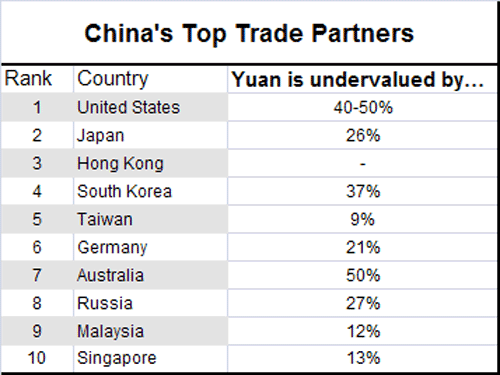China Currency Poses Greatest Danger to Global Economic Recovery
Currencies / China Currency Yuan Feb 27, 2010 - 02:13 PM GMTBy: Bryan_Rich
 Toward the end of last year, many market followers were speculating on a Fed hike as early as the first half of 2010. Global stock markets had experienced explosive bounces, commodity prices had surged from the crisis lows, and risk spreads and market volatility had all subsided.
Toward the end of last year, many market followers were speculating on a Fed hike as early as the first half of 2010. Global stock markets had experienced explosive bounces, commodity prices had surged from the crisis lows, and risk spreads and market volatility had all subsided.
In short, markets were pricing in a very optimistic outlook for global economic recovery — a return to normalcy.
But just two short months into 2010, the exuberance about recovery has deflated. As I’ve explained in many of my Money and Markets columns, the world is still saddled with problems and vulnerable to lurking threats …
In the U.S., unemployment is sustaining high levels, the housing market continues to weigh on consumer balance sheets and confidence has again taken a dive.
There is more uncertainty, which is likely to impact the prospects for global growth. People are waking up to what’s likely a long road to recovery, given the damage from, what Alan Greenspan calls, “the worst financial crisis ever.”
And for now, the global financial markets are taking cues from three key themes …
Theme #1: Sovereign Debt Problems
 |
| Fiscal problems in Greece are mushrooming into a global, sovereign debt crisis. |
The saga surrounding Greece’s finances has created tremors in the European monetary union. And the speculative pressures on countries surrounding their fiscal challenges will likely find bigger targets in the coming months, namely the UK, Japan and the U.S.
The impact of this theme on global growth prospects: Negative.
Theme #2: China Tightening Credit
The bubble alarm for Chinese authorities was the massive surge of new loans in the first half of January. New bank loans last month approached levels of last year, when liquidity pumping was in emergency mode. Now China is tightening up bank reserve ratios and curtailing easy money programs, fearing a bubble burst of its own.
The impact of this theme on global growth prospects: Negative.
Theme #3: Fed’s Exit Strategy
The Fed’s move in the discount rate last week was the first active step it has taken toward reversing its emergency policies. Up to that point, the Fed had only guided (or allowed) the programs in place to either expire or mature — indeed, passive steps. And the timing was a surprise …
 |
| The Fed’s bumping up the discount rate was a growth positive sign. |
The move came only eight days after the text of a Bernanke speech that said the discount rate would start moving higher “before long.”
To act so soon after making that comment will create loads of excitement and speculation whenever the Fed chooses to drop the magic words — “extended period” — from its guidance on keeping the benchmark Fed Funds rate at current levels.
The impact of this theme on global growth prospects: Positive.
Overall …
A Sentiment Shift Has Taken Place
These three themes are keeping the dollar on solid footing and keeping pressure on European currencies and those currencies that are dependent upon sustained growth and demand from China (i.e. the Australian dollar, the New Zealand dollar, Brazilian real).
With all of that said, there is clearly a sentiment shift that has taken place when it comes to the recovery prospects for global economies.
Now the growing consensus is shifting away from the theories of a V-shaped economic recovery and toward the alternative scenarios … most visibly, a sovereign debt crisis.
But while a sovereign debt crisis is already underway and will likely continue to spread, I don’t think it’s the biggest threat to the global economy.
Rather, the biggest threat will likely come from growing trade tensions between China and the rest of the world.
That’s because …
China’s Currency Is Enemy #1 to Global Recovery
Over the last 14 years, China’s economy has grown a whopping eight-fold, to $4.9 trillion, and has quickly ascended to become the world’s third-largest economy.
During the same period, the U.S. economy has only doubled in size.
As far as currencies are concerned, the dramatic outperformance of the Chinese economy relative to the U.S. economy would normally be reflected in a much stronger Chinese currency.
But, of course, China controls the value of its currency. They allowed it to strengthen only 18 percent during those 14 years — a mere drop in the bucket.
And that’s where tensions are threatening to boil over. It’s not just with its key export market, the United States, but equally as tumultuous with its Asian neighbors.
Just how out of line is China’s currency?
Let’s take a look …
In the table below, you can see on a purchasing-power parity basis, the Yuan (China’s currency) is 40 percent to 50 percent too cheap relative to the U.S. dollar.

Source: IMF
You can also see how China’s export-centric neighbors are feeling the pain of China’s artificially cheap currency, too. For example, based strictly on currency values, it would cost 37 percent more to import identical goods from South Korea than it would from China.
Threat of Protectionism
In my September 19 column, Protectionism an Enemy of Recovery, I wrote extensively about the threats that protectionism represents to the global economy.
And it’s widely believed that the world economy cannot find a path of sustainable growth until those key countries with lopsided trade become more balanced.
Consequently, the G-20 has made Chinese currency policy its number one agenda, under the code word “rebalancing.”
 |
| China’s unwillingness to let the Yuan strengthen could hinder global recovery. |
As it becomes increasingly evident that China will not play ball on allowing its currency to appreciate to a fair value, expect the geopolitical tensions to rise and expect to see two forms of protectionism follow: Trade tariffs and currency devaluations against major currencies, to which the value of the Yuan is primarily linked.
And while a global economic recovery is already beginning to look like a longer road than many have expected, an outbreak of protectionism would likely derail recovery all together.
That’s why I continue to think that safety and capital preservation will re-emerge as the primary driver of capital flows around the world towards the U.S. dollar.
Regards,
Bryan
This investment news is brought to you by Money and Markets. Money and Markets is a free daily investment newsletter from Martin D. Weiss and Weiss Research analysts offering the latest investing news and financial insights for the stock market, including tips and advice on investing in gold, energy and oil. Dr. Weiss is a leader in the fields of investing, interest rates, financial safety and economic forecasting. To view archives or subscribe, visit http://www.moneyandmarkets.com.
© 2005-2022 http://www.MarketOracle.co.uk - The Market Oracle is a FREE Daily Financial Markets Analysis & Forecasting online publication.



